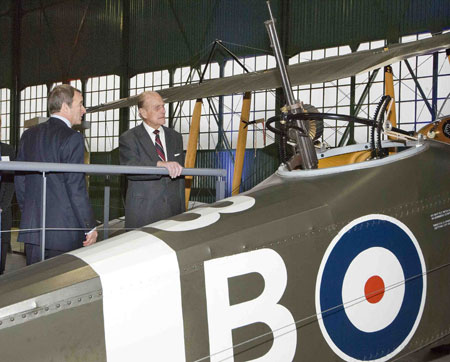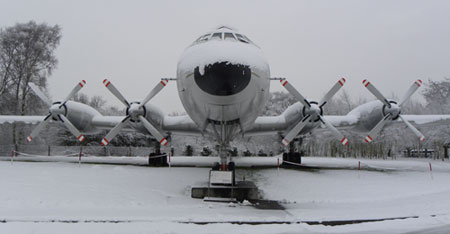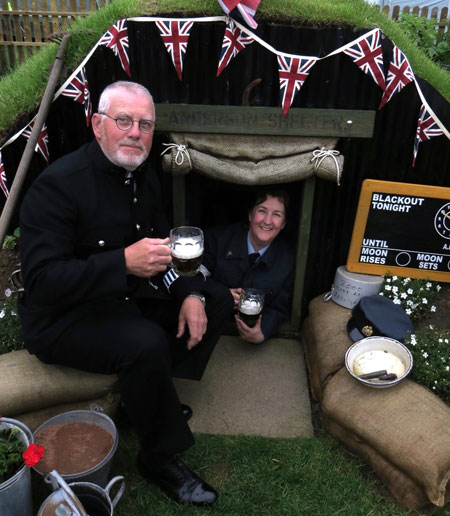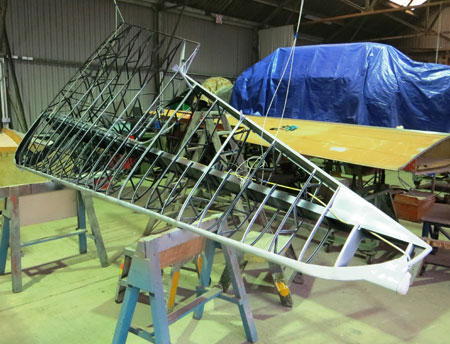
Today The Duke of Edinburgh conducted the official opening of a new permanent First World War exhibition at the Royal Air Force Museum London.
Whilst at the Museum, His Royal Highness met and spoke with members of Museum staff as well as designers and technicians who worked on the exhibition.
Karen Whitting, Director of Public Programmes at the Royal Air Force Museum, said: “It was a pleasure and an honour to have the Museum’s Royal Patron The Duke of Edinburgh, open this landmark exhibition The Museum looks forward to sharing this incredible story with both local visitors and audiences from across the globe. It is particularly fitting that we mark this anniversary in the approach to 2018, the centenary of the founding of the Royal Air Force.”
Blondel Cluff, Chair of the Heritage Lottery Fund London Committee, said: “Thanks to lottery players, this new permanent exhibition means that the RAF Museum will be able to play a full part in marking the centenary of the First World War, bringing to the fore an important but currently less well known aspect of the War.”
Chris Boardman, Managing Director of BAE Systems Military Air and Information, said:
“The evolution of the Royal Flying Corps and Royal Air Force from 1912 to the present day is closely intertwined with the growth of BAE Systems and its predecessor companies. We are delighted to be supporting the opening of this new gallery and the ambitious plans to redevelop the site over the next four years to inspire future generations of engineers and entrepreneurs.”
The ‘First World War in the Air’ is a new permanent exhibition supported by the Heritage Lottery Fund (HLF), that will enable visitors to discover and explore the unique and often overlooked role of air power during the First World War through the incredible stories of the men and women who served and protected our nation
Set in a Grade II listed building, which was part of one of the factories where aircraft were constructed for the First World War; the exhibition uses these authentic surroundings and the RAF Museum’s world-class collection of aircraft, documents, film and photographs to reveal how aviation changed the character of war forever.
Described as the ‘Birthplace of Aerial Power’, the story of air power at Hendon began in 1862 when Henry Coxwell took a short flight in a balloon to a field near Mill Hill. In 1910, the site on which the RAF Museum is located was purchased by The London Aerodrome Company, then sold to aviation pioneer Claude Grahame-White in 1911. Grahame-White was a noted name in the early development of British aviation and his Grahame-White Aviation Company began building aircraft in 1910. During the First World War Hendon played an important role in the development of air power and pilots for both the Royal Naval Air Service and Royal Flying Corps trained at the site. In just ten years, driven by the requirements of the conflict, aviation technology developed from being barely able to cross the English Channel in 1909 to crossing the Atlantic in 1919.
Designed by Ralph Appelbaum Associates, the exhibition explores what it was like to be involved in the earliest days of military aviation through the story of Britain’s air services, the Royal Flying Corps and Royal Naval Air Service. These two organisations merged on 1 April 1918 to become the world’s first independent air force, the Royal Air Force. Displays incorporate the experiences of pilots, ground crew and factory workers to help tell this fascinating story.
Exhibits include iconic aircraft such as the Sopwith Camel, the Fokker D VII and an example of an aircraft that was built in the factory at Colindale – the Avro 504. The exhibition’s narrative-led design is rich with interactivity, dramatic media and diverse collections. The thrilling story of the evolution of flight, from the early days of experimentation to full-force fighting machines, is underpinned by stories of people ‘on the ground’. The exhibition also explores the extraordinary expansion of Britain’s air services, the Royal Flying Corps and Royal Naval Air Service, from 1,800 men in 1914 to a Royal Air Force of 290,000 men and women at the end of the war in 1918.
As part of ‘First World War in the Air’ the creation of temporary exhibitions and supporting activities will include programmes for lifelong learning, volunteering, apprenticeships and public events. This four-year project marks the Centenary of the First World War, exploring the development of air power as an integral part of modern warfare including the birth of the RAF itself in 2018.
A linked online resource includes the digitisation of and wider public access to historical documents such as First World War Casualty Cards, Casualty Forms and Muster Rolls, that tell the story of the men and women of the Royal Flying Corps and Royal Air Force. This will be of particular interest to genealogists and family historians. These can be accessed at www.rafmuseumstoryvault.com
The First World War in the Air exhibition was made possible with a grant of £898,558 from the Heritage Lottery Fund (HLF).
The Museum would also like to thank BAE Systems for its support for the exhibition.





